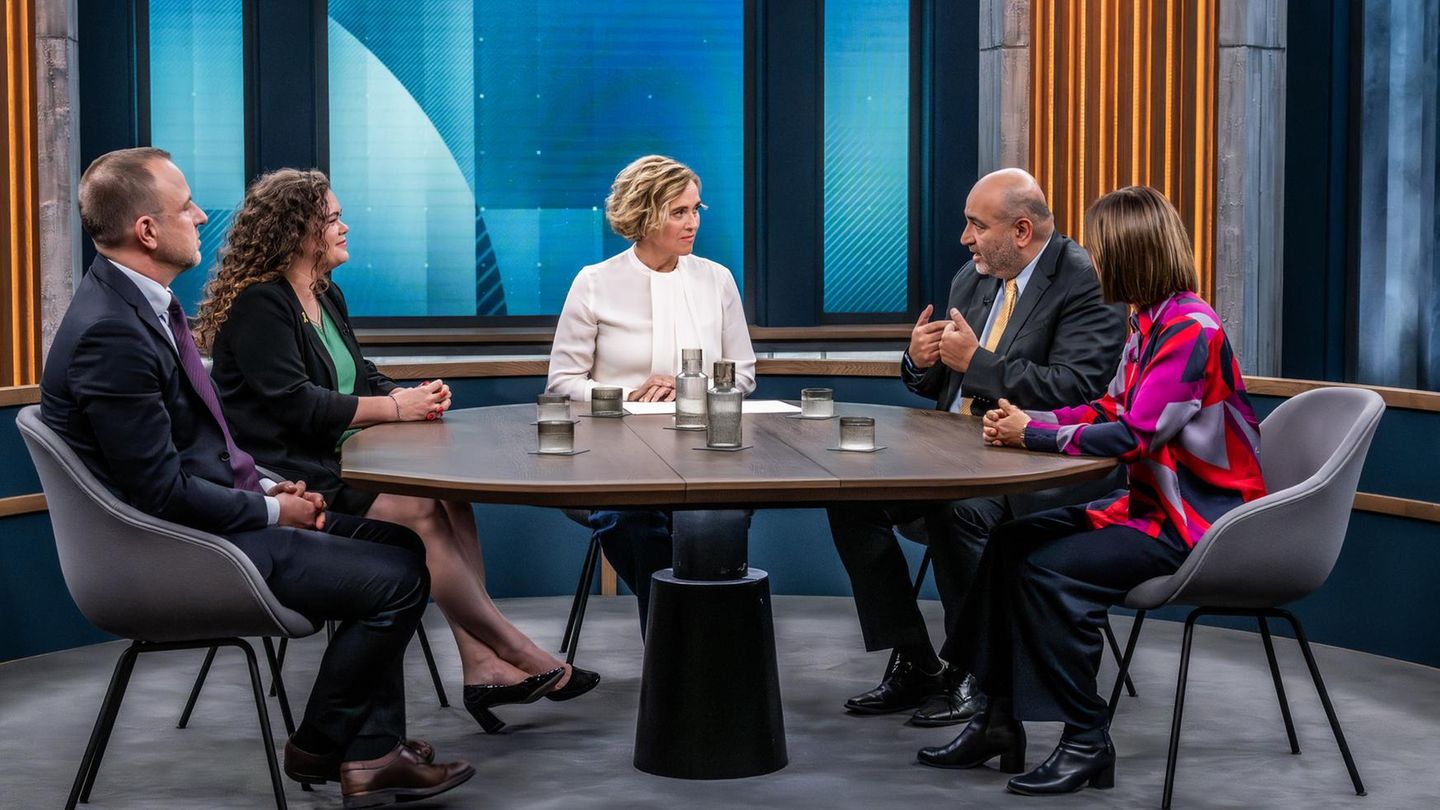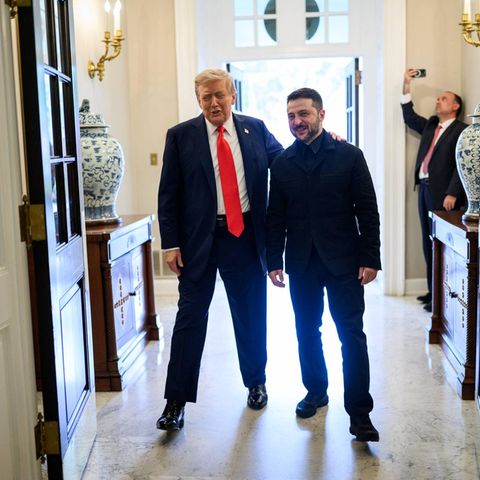“Caren Miosga”
“The UN is a warring party together with Hamas”
Copy the current link
Add to wishlist
An hour-long talk show, concentrated expertise – and yet there is hardly any dynamism in the evening with “Caren Miosga”. Only one topic creates tension.
It was already clear that Sunday evening at “Caren Miosga” could be a bit monotonous when the guest list was announced. Sitting at the table alongside Bundestag Vice President Omid Nouripour (Greens) are Anna Sauerbrey, foreign policy coordinator at “Die Zeit”, political scientist Peter R. Neumann and German-Israeli entrepreneur Jenny Havemann. The question of the evening: “Middle East and Ukraine: How effective is the Trump method?”.
Miosga describes the fact that Hamas released the Israeli hostages that were still alive as a “masterpiece by Donald Trump.” But an editorial clip makes it clear how fragile this peace plan actually is. The morning before the broadcast, the ceasefire in the Gaza Strip was broken: Hamas is said to have attacked Israeli soldiers, to which Israel responded with air strikes.
A production company that had been working with ZDF for decades was also hit, says Green external expert Nouripour. “That no longer has much to do with proportionality.”
Political scientist Peter Neumann sees the cause of the breach of the ceasefire in a “construction error” in the peace plan. It was foreseeable that the withdrawal of the army would create a “vacuum” – and with it the question: “Who will ensure law and order?” The problem with Trump’s method, according to Neumann, is that it is a “quick deal” but not a sustainable solution.
Caren Miosga decides not to give a solo interview
Instead of the classic solo conversation at the beginning, this time Caren Miosga gathers all the guests around him from the start. She asks her questions in turn, the guests answer politely. However, there is no lively exchange of blows – the assessments are too similar to bring tension into the conversation.
It wasn’t until about half an hour later that the first point of contention emerged. The topic is international aid for the people in the Gaza Strip. The political blogger Jenny Havemann, who has lived in Israel since 2010, warns: “In my view, the UN is a warring party along with Hamas.” She refers to UNRWA, the United Nations relief agency for Palestine refugees in the Middle East. Its employees “cheered” in chat groups after October 7, 2023 and even took part in the attack, says Havemann – and goes one step further: “In my view, UNRWA must be disbanded.” Miosga asks in disbelief, Havemann repeats her suggestion. Instead of digging further, Miosga passes the question on to Green Party politician Nouripour – almost as if she, too, hopes that this will give the group some life.
Havemann partly agrees with him: “It is true that many UNRWA employees in Gaza worked very closely with Hamas.” However, he objects to the dissolution of the aid organization. At the same time, he emphasizes that “urgent pressure” must be applied to change the role of the aid agency in Gaza and calls for educational work to investigate what has gone wrong so far.
Anyone who thought that this would be the starting signal for a lively discussion will be disappointed. The conversation quickly returns to the familiar rhythm of the first half: Miosga asks, the guests answer. Political disputes remain rare.
Hope for an agreement in Ukraine
However, the conversation becomes exciting when the question arises as to whether Trump’s rapid-fire diplomacy could also have an effect on Putin. The two are scheduled to meet a second time in the next two weeks to negotiate peace in Ukraine.
Journalist Sauerbrey is cautiously optimistic. Unlike before, the meeting is being prepared by US Secretary of State Marco Rubio – not by special envoy Steve Witkoff, who caused “a lot of misunderstandings” in previous negotiations with Putin, said Sauerbrey.
The judgment of the political scientist Neumann, however, is more negative. “I think Donald Trump basically doesn’t have much sympathy for Ukraine.” He emphasizes that Trump gets along well with Putin, but not with Zelensky: “He sees Vladimir Putin as an equal, as the leader of a great power – he doesn’t see that in Zelensky.” Neumann says it is “a bit naive” to believe that the Europeans can convince Trump of their position.
The viewer is left with some interesting analysis, but only a few different viewpoints. It’s good to watch an hour-long talk show without the conversation descending into political trench warfare. But a little friction would have been good for the round. Now the focus is on Budapest, where the meeting between the two great powers is scheduled to take place. It will be shown there whether Trump can achieve another “masterpiece”.
Source: Stern
I have been working in the news industry for over 6 years, first as a reporter and now as an editor. I have covered politics extensively, and my work has appeared in major newspapers and online news outlets around the world. In addition to my writing, I also contribute regularly to 24 Hours World.





